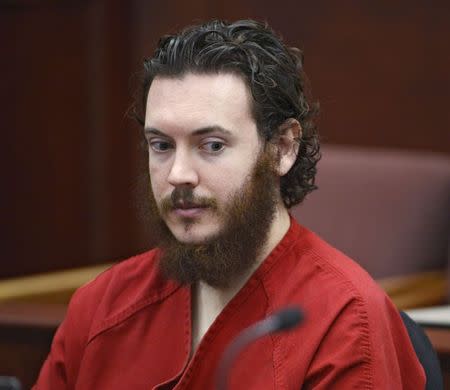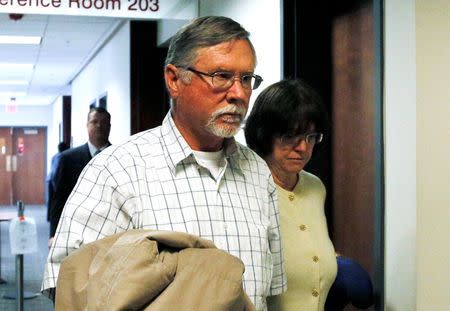Colorado movie massacre defense: We need to talk about James
By Daniel Wallis and Keith Coffman CENTENNIAL, Colo. (Reuters) - In a hushed courtroom on the outskirts of Denver, defense lawyers played family videos of a young boy sitting on a sofa in shorts and a T-shirt, playing on a slide in a park, and frolicking in waves on a sunlit beach. The films gave no hint of the violence that would later be committed by James Holmes, who could face the death penalty if convicted of murdering 12 people and wounding 70 others by opening fire inside a suburban Denver multiplex in July 2012. Painting a picture of a bright, normal child who could have belonged to any member of the jury before he fell prey to severe mental illness that runs in his family, Holmes' lawyers will seek to save the now 27-year-old's life. The murder trial of the former neuroscience graduate student, who never looked up as images of his childhood flashed by on the screen, began last month, and prosecutors are expected to spend another four or five weeks making their case. But the strategy of Holmes' public defenders already looks clear: If they fail to win an acquittal on the grounds their client was insane when he planned and carried out the massacre, they would still only need the support of one juror for Holmes to be spared execution. Holmes' attorneys will highlight his "loving, caring" middle class California upbringing, and will say that in elementary school he was an interactive, social child who became withdrawn only later. "There's no record of him ever harming anyone that we can find, and we've talked to everybody. There's no record of him manipulating anyone, or bullying anyone," public defender Dan King told jurors in his opening statement. "He never got a speeding ticket until he came to the state of Colorado. He worked hard. He got good grades. He did the right things and wanted to make something out of himself. He was what we all want our children to be like." Prosecutors, who will have to prove Holmes was sane at the time of the rampage, say he carried out the massacre after losing his job and his girlfriend, and that he harbored a "longstanding hatred of mankind." Holmes' lawyers say he suffers from schizophrenia, that since high school he has heard voices in his head commanding him to kill, and that he was not in control of his actions when he planned and launched the attack. (Full coverage:) FAMILY INHERITANCE His lawyers say that as Holmes grew older and started to feel different, he began to think about suicide. He tried to kill himself at age 11. That is something doctors "will tell you doesn't happen unless something is seriously wrong," King told the jury. But he said nobody noticed his client's insipient sickness. "Why? Because he was getting straight As, and he was causing no problem, and he was a good kid." Prosecutors say two court-appointed forensic psychiatrists examined Holmes after his arrest and found him sane. The defense says their client was seen by multiple doctors, none of whom thought he was malingering. King said schizophrenia can show signs during adolescence, he said, but typically erupts into full psychosis in the early 20s. He said the defendant had been both blessed and cursed by genetics that made him whip smart, but also loaded him for mental illness. Both Holmes' grandfathers suffered debilitating brain diseases, King told the court. His paternal grandfather was a career military planner who started suffering from psychosis as a cadet at West Point. His mother's father was a parking lot attendant who was hospitalized after acting oddly and handing money to customers, instead of taking it. The defense lawyer said an aunt, his father's twin, also suffers from serious mental illness. "She didn't cooperate with us because of the paranoid nature of her delusional disease," King said, holding a doctor's letter showing she was diagnosed with a type of schizophrenia. As they seek to portray Holmes as the victim of a disease that could afflict any family, and not a calculating mass killer, his public defenders may call his parents Arlene and Bob to testify. King told the jury Holmes' parents, who have sat through the trial mostly looking stunned, were hard-working people who took him to church and taught him right from wrong. "Mr. Holmes happens to be Bob and Arlene Holmes' son, but he really could be anyone's son," King said. "Because schizophrenia doesn't play favorites, and when it strikes it robs the individual of their reality." (Reporting by Daniel Wallis and Keith Coffman; Editing by Cynthia Johnston and Richard Chang)


